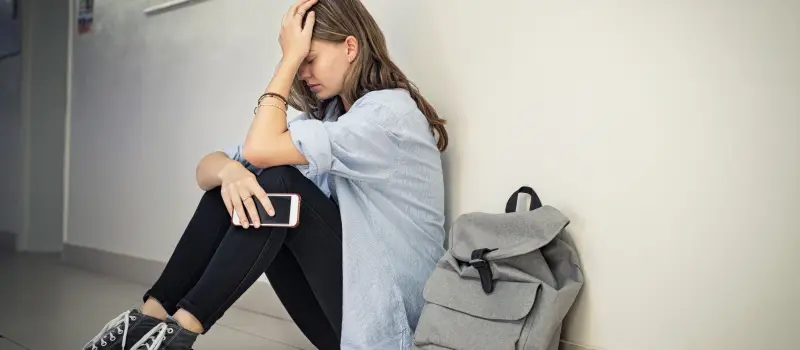
Table of Contents
Teenage Girl Depression: Causes, Symptoms, and Treatment

Written By: Ashley Laderer

Clinically Reviewed By: Dr. Don Gasparini
April 3, 2023
8 min.
Teenage girls are experiencing high rates of depression and struggling with their mental health. Learn more about why this is the case and what to do about it.
Learn more about our Clinical Review Process
Table of Contents
Teenage girl depression may be more common today than ever before. With the release of very concerning recent data, the CDC says that teen girls are reporting higher-than-ever levels of sadness and suicide risk.
57% of teen girls shared that they felt “persistently sad or hopeless” over the course of the research study –– which is twice the rate that boys reported.
On top of this, 30% of teen girls disclosed that they seriously considered suicide, which is 60% higher than reported 10 years ago.
It’s therefore no secret that a lot of teen girls are struggling with their mental health right now –– but why is this happening, and what can we do about it?
Here’s what you need to know about the prevalence of teenage girl depression, signs to look out for, and how to treat it.
Why is teenage girl depression so common?
While people of all ages and genders experience depression, the data shows that teenage girl depression is particularly prevalent.
Some potential risk factors for depression and other mental health struggles in teenage girls include:
Social media use
Teens today spend a lot of time on social media –– and while this allows them to connect with others in unique ways, excessive use may contribute to poor mental health. Various studies have found relationships between increased time spent on social media and increased risk of anxiety and depression symptoms.
Body image/self-esteem
Whether teen girls are looking towards their classmates, people on social media, or celebrities, they may compare themselves to others, which can negatively affect their body image and overall self-esteem, which can ultimately lead to negative mental health outcomes. Up to 70% of girls feel like they aren’t good enough –– in relation to looks, interpersonal relationships, or school performance. Having low self-esteem may be a predictor of developing depression or further contribute to depressive symptoms.
Bullying
School bullying and cyberbullying can have detrimental effects on a teen’s mental health. People of color and people in the LGBTQIA+ community experience the highest rates of bullying –– so teenage girls who fall in these categories are particularly at-risk. Being a victim of bullying can potentially lower someone’s self-esteem and contribute to anxiety and/or depression.
Sexual trauma
The recent statistics surrounding sexual violence are very troubling. According to the CDC, one in five teen girls were survivors of sexual violence during the year they were surveyed, and more than 1 in 10 teen girls were forced to have sex. Dealing with this type of trauma can be very challenging to cope with for a teenage girl. Sexual trauma can contribute to negative mental health outcomes, especially if not treated.
On top of all this, overall risk factors for depression in teens include:
- Having a family history of major depressive disorder
- Being a victim of violence (physical or sexual) or a witness of violence
- Being diagnosed with another mental health condition
- Being diagnosed with attention-deficit/hyperactivity disorder (ADHD)
- Being diagnosed with a learning disability
- Having a chronic health condition or chronic pain
- Abusing drugs or alcohol
- Being LGBTQIA+ without a supportive environment
Join the Charlie Health Library
Get mental health updates, research, insights, and resources directly to your inbox.
You can unsubscribe anytime.
What are the signs of teenage girl depression?
Major depressive disorder (AKA clinical depression or simply depression) is a mood disorder which can seriously impact someone’s life. Depression is generally characterized by chronic feelings of sadness or a low mood and losing interest and joy in once-enjoyed activities. This mood disorder can affect all aspects of a teenage girl’s life –– including school, friends, family, work, and romantic relationships –– keeping them from enjoying their teen years to the fullest.
Major depressive disorder may present slightly differently in teens than in adults. Of course, you aren't a mind reader. It can be difficult to know exactly how someone is feeling, especially if they aren’t very open about their emotions. However, there are some behaviors or outward signs that you may be able to notice, particularly if they are new.
As an adult, recognizing depression in a teenage girl may be particularly tricky, as there is a stereotype about teens being moody and acting out. However, mood disorders are far more serious than moodiness.
So, how do you know if it is teen moodiness or teen depression? Major depressive symptoms in teenage girls may look like:
- Underperforming at school and low grades
- Missing school all the time and having poor attendance
- Drinking alcohol and/or using illicit drugs
- Saying they feel misunderstood
- Eating too much or too little
- Sleeping too much
- Losing interest in things they used to enjoy
- Self-harm
- Withdrawing from others and avoid socializing with friends
Across the board, regardless of age and gender, major depressive symptoms include:
- Having an ongoing low or sad mood
- Feeling pessimistic, helpless, or hopeless
- Feeling irritable and restless
- Feeling worthless or guilty
- Experiencing fatigue and an overall lack of energy
- Having cognitive difficulties such as struggling with concentration or memory
- Having trouble sleeping
- Experiencing unintentional weight changes
- Unexplained physical symptoms such as GI symptoms or other pains
- Thinking about death
- Contemplating suicide
- Attempting suicide
For someone to receive a diagnosis of major depressive disorder, they have to be experiencing major depressive symptoms for a minimum of two weeks. Furthermore, the symptoms have to be interfering with one’s daily functioning.

What are the complications of teenage depression?
It is crucial for depression in teenage girls to be treated as soon as possible. This will not only benefit them during their teen years, but also down the line in adulthood. In some cases, this could be a matter of life and death –– and depression should never be ignored.
Complications associated with depression in teenage girls include:
Substance use
Depressed teens might try to get drunk or high to escape their difficult emotions. Whether teenagers are drinking alcohol or taking illicit drugs, substance use is risky in multiple ways. Teens may not be fully educated on the risks of drugs and alcohol, and they may accidentally consume too much which can lead to a dangerous overdose. Additionally, using drugs can lead to addiction and substance use disorder.
Self-harm
Self-harm, also known as self-mutilation or non-suicidal self-injury, is when someone hurts themself on purpose, such as by cutting or burning themself. This is often done to deal with tough emotions, to feel a release, or as a means of self-punishment. While many people who self-harm do not have the intention to attempt suicide, the behavior is still very unhealthy and dangerous, potentially resulting in serious injuries. Research shows that teenage girls –– particularly those who have depression or an anxiety disorder –– are more likely to self-harm than teenage boys are.
Suicidal ideation
Sadly, it is common for people with depression to think about death and suicide, thinking that they might be better off dead, or even thinking that those around them would be better off if they were gone. Teenage suicide is an urgent public health matter, as the National Institute of Mental Health states that suicide is the second leading cause of death amongst adolescents ages 10 through 14, and the third leading cause of death amongst teens and young adults ages 15 through 24.
Suicidal people may keep their thoughts to themselves, or you might notice them acting suspiciously. They make remarks that hint at them dying, start to give away belongings, or write suicide notes. The CDC reports that teenage girls are more likely than teenage boys to attempt suicide.
Do you need more support with
your mental health?
Charlie Health can help.
What is the treatment for depression in teenage girls?
It’s important to let your loved one know you are there for them and to listen to them in a supportive and non-judgemental way. But the best way you can help a teen with depression is to help them get the professional help they need. Regardless of someone’s age or gender, depression treatment is similar across the board to improve symptoms and overall well-being.
Psychotherapy, commonly referred to as talk therapy, and psychiatric drugs are the two main treatment options for depression.
Two of the most commonly used forms of psychotherapy for depression treatment include:
- Cognitive behavioral therapy (CBT): CBT is often used as a first line of treatment for mental health conditions like depression. This therapy helps individuals learn how their thoughts, feelings, and behaviors all interact and influence each other. They will become more aware of their thoughts and feelings while learning how to reframe pervasive negative beliefs. They’ll also address unhealthy, unhelpful behaviors that could be responsible for fueling depression.
A lot of CBT consists of challenging cognitive distortions, which are unhelpful or distorted ways of thinking –– such as black-and-white or all-or-nothing thinking, which is common in people with depression. CBT helps people to challenge these cognitive distortions and create healthier thought patterns. Furthermore, they will learn valuable new strategies and coping skills to deal with depression and any other difficult emotions that may crop up.
- Dialectical behavior therapy (DBT): DBT is a form of therapy that helps people learn to understand and regulate their emotions. Individuals learn about acceptance and change –– meaning that they can accept themselves and their current challenges, but they also understand that it is possible to make healthy and positive changes with hard work and dedication. On top of emotional regulation, other key themes include self-acceptance and healthy interpersonal relationships.
While in a DBT program, there is a combination of skills training, individual therapy, and supported groups. Some important skills taught are distress tolerance, emotional regulation, and interpersonal effectiveness.
In some cases, therapy and medication are used in conjunction with one another. It all depends on the individual and whether their mental health providers think they could benefit from medication. Antidepressants can help someone manage and reduce their symptoms alongside all the work they are doing in therapy.
It is important to work alongside an adolescent psychiatrist who is knowledgeable on which antidepressants are best suited for teenagers. Additionally, when a teen is starting an antidepressant, it is important to let them know that it can take at least a few weeks for the medication to kick in and for them to feel a remarkable difference. They will need to be patient during this time. Urge them to let their provider know if they have any side effects or are experiencing a worsening of depressive symptoms.
How can Charlie Health help?
If you think that a teenage girl in your life is struggling with depression, Charlie Health may be able to help.
Our virtual intensive outpatient program provides mental health care for teens who are coping with various mental health conditions, such as depression.
Assure your loved one that while depression can make them feel helpless and hopeless at times, effective professional help is available and there is absolutely hope for them to feel better and enjoy their life again.
References
https://www.ncbi.nlm.nih.gov/pmc/articles/PMC6428741/
https://www.mayoclinic.org/diseases-conditions/depression/symptoms-causes/syc-20356007
https://www.mayoclinic.org/diseases-conditions/teen-depression/symptoms-causes/syc-20350985
https://www.nimh.nih.gov/health/topics/depression
https://www.hopkinsmedicine.org/health/conditions-and-diseases/teen-suicide





